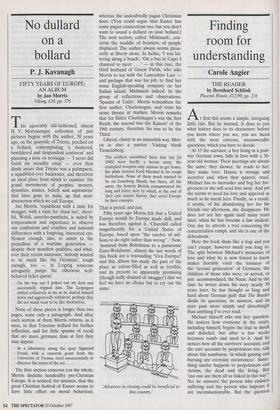No dullard on a bollard
P. J. Kavanagh
FIFTY YEARS OF EUROPE: AN ALBUM by Jan Morris Viking, £20, pp. 376 This agreeably old-fashioned, almost H. V. Mortonesque collection of pen pictures begins with the author, 50 years ago, on the quayside of Trieste, perched on a bollard, contemplating 'a shattered, bewildered and despondent continent' and planning a note on nostalgia — 'I never did finish my maudlin essay' — even then dimly aware that Trieste was a palimpsest, a squabbled-over backwater, and therefore an ideal place from which to examine 'the grand movements of peoples, moneys, dynasties, armies, beliefs and aspirations' that have gone to make up that near- abstraction which we call Europe.
Jan Morris, 'republican with a taste for swagger, with a taste for ritual too', cheer- ful, Welsh, anarcho-pantheist, is suited by temperament and experience to observe our confusions and cruelties and national differences with a forgiving, interested eye. Honest enough, also, to admit to the prejudices of a wartime generation despite their manifest qualities, and what- ever their recent successes, 'nobody wanted to be much like the Germans'; tough enough, too — in Leipzig someone arrogantly jumps the otherwise well- behaved ticket queue: On his way out I poked out my foot and successfully tripped him. The Leipzigers smiled collusively at me as he dusted himself down and aggrievedly withdrew; perhaps they did not much want to be like themselves.
None of these pieces is longer than two pages, some only a paragraph. And after each section of them Morris returns, as it were, to that Triestine bollard for further reflection, and for little spasms of recall that are more germane than at first they may appear: In a laboratory along the quay Sigmund Freud, with a research grant from the University of Vienna, tried unsuccessfully to discover the testes of the eel ...
The first section concerns (on the whole; Morris disdains handcuffs) pre-Christian Europe. It is noticed, for instance, that the great Christian festival of Easter seems to have little effect on moral behaviour, whereas the undoubtedly pagan Christmas does. (You could argue that Easter has some pagan connections too, but you don't want to sound a dullard on your bollard.) The next section, called 'Mishmash', con- cerns the muddle of frontiers, of people displaced. The author always seems pleas- antly at liberty alone. In Ischia, 'I was loi- tering along a beach', 'On a bus in Capri I chanced to meet . . . ' — in this case, the third husband of Gracie Fields, who asks Morris to tea with the Lancashire Lass and perhaps that was his job, to find her some English-speaking company on her Italian island. Mishmash indeed. In the group of reflections and observations, `Spasms of Unity', Morris remembers the first unifier, Charlemagne, and visits his stone throne at Aachen. Morris remarks that for Hitler Charlemagne's was the first Reich, the second was the Kaisers' of the 19th century, therefore his was to be the Third.
Liberal, chatty in an unmodish way, Mor- ris is also a patriot. Visiting bleak Tiemeloberg:
The soldiers assembled there that day [in 19451 were hardly a heroic army, the crumpled troopers only anxious to get home, the plain teetotal Field Marshal in his rough battledress. None of them much wanted to be on Luneberg Heath; but there, all the same, the homely British consummated the long and bitter duty by which, at the end of their epic insular history, they saved Europe by their example.
That is proud, and just.
Fifty years ago Morris felt that a United Europe would he Europe made dull, and was therefore against it. 'Churchill called magnificently for a United States of Europe, based upon "the resolve of mil- lions to do right rather than wrong" .' Now, `matured from Britishness to a passionate Euro-Welshness', almost the last words of this book are a resounding 'Viva Europa!' and this Album has made the past of the place so colour-filled as well as terrible, and its present so apparently promising (though sadly drained of 'swagger') that we feel we have no choice but to cry out the same.
Advances in cloning could be beneficial to this country.'


















































































 Previous page
Previous page